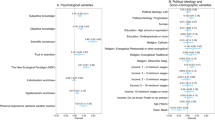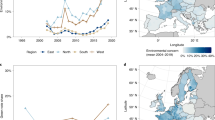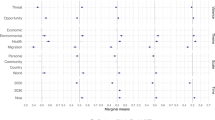Abstract
Although perceptions of common weather phenomena moderately align with instrumental measurements of such phenomena1, the evidence that weather or climatic conditions influence beliefs about anthropogenic climate change is mixed2,3,4,5,6,7,8,9,10,11,12,13. This study addresses both foci, which are important to scholars who investigate human–environment interactions and observers who expect greater exposure to weather or climate extremes to translate into stronger support for climate change adaptive measures and mitigative policies. We analyse the extent to which state-level winter temperature anomalies influence the likelihood of perceiving local winter temperatures to be warmer than usual and attributing these warmer temperatures mainly to global warming. We show that actual temperature anomalies influence perceived warming but not attribution of such warmer-than-usual winter temperatures to global warming. Rather, the latter is influenced more by perceived scientific agreement; beliefs about the current onset, human cause, threat and seriousness of global warming; and political orientation. This is not surprising given the politicization of climate science14,15 and political polarization on climate change beliefs16,17 in recent years. These results suggest that personal experience with weather or climate variability may help cultivate support for adaptive measures, but it may not increase support for mitigation policies.
This is a preview of subscription content, access via your institution
Access options
Subscribe to this journal
Receive 12 print issues and online access
$209.00 per year
only $17.42 per issue
Buy this article
- Purchase on Springer Link
- Instant access to full article PDF
Prices may be subject to local taxes which are calculated during checkout

Similar content being viewed by others
References
Howe, P. D. & Leiserowitz, A. Who remembers a hot summer or a cold winter? The asymmetric effect of beliefs about global warming on perceptions of local climate conditions in the U. S. Glob. Environ. Change 23, 1488–1500 (2013).
Zahran, S., Brody, S. D., Grover, H. & Vedlitz, A. Climate change vulnerability and policy support. Soc. Nat. Resour. 19, 771–789 (2006).
Hamilton, L. C. & Keim, B. D. Regional variation in perceptions about climate change. Int. J. Climatol. 29, 2348–2352 (2009).
Egan, P. J. & Mullin, M. Turning personal experience into political attitudes: The effect of local weather on Americans’ perceptions about global warming. J. Politics 74, 796–809 (2012).
Scruggs, L. & Benegal, S. Declining public concern about climate change: Can we blame the great recession? Glob. Environ. Change 22, 505–515 (2012).
Howe, P. D., Markowitz, E. M., Lee, T., Ko, C. & Leiserowitz, A. Global perceptions of local temperature change. Nature Clim. Change 3, 352–356 (2013).
Hamilton, L. & Stampone, M. ‘Blowin’ in the wind: Short-term weather and belief in anthropogenic climate change. Weath. Clim. Soc. 5, 112–119 (2013).
Shao, W., Keim, B. D., Garand, J. C. & Hamilton, L. C. Weather, climate, and the economy: Explaining risk perceptions of global warming, 2001–2010. Weath. Clim. Soc. 6, 119–134 (2014).
Brody, S. D., Zahran, S., Vedlitz, A. & Grover, H. Examining the relationship between physical vulnerability and public perceptions of global climate change in the United States. Environ. Behav. 41, 72–95 (2008).
Schuldt, J. & Schwarz, N. Do People Believe in Global Warming?: It Depends on What the Weather is Like When You Ask (Society for Personality and Social Psychology, 2008)
Brulle, R. J., Carmichael, J. & Jenkins, J. C. Shifting public opinion on climate change: An empirical assessment of factors influencing concern over climate change in the U. S. 2002–2010. Climatic Change 114, 169–188 (2012).
Goebbert, G., Jenkins-Smith, H. C., Klockow, K., Nowlin, M. & Silva, C. Weather, climate, and worldviews: The sources and consequences of changes in local weather patterns. Weath. Clim. Soc. 4, 132–144 (2012).
Shum, R. Y. Effects of economic recession and local weather on climate change attitudes. Clim. Policy 12, 38–49 (2012).
McCright, A. M. & Dunlap, R. E. Anti-reflexivity: The American conservative movement’s success in undermining climate science and policy. Theory Cult. Soc. 27, 100–133 (2010).
Oreskes, N. & Conway, E. M. Merchants of Doubt: How a Handful of Scientists Obscured the Truth on Issues from Tobacco Smoke to Global Warming (Bloomsbury, 2010).
Hamilton, L. C. Education, politics, and opinions about climate change: Evidence for interaction effects. Climatic Change 104, 231–242 (2011).
McCright, A. M. & Dunlap, R. E. The politicization of climate change and polarization in the American public’s views of global warming, 2001–2010. The Sociological Quarterly 52, 155–194 (2011).
Rahmstorf, S. & Coumou, D. Increase of extreme events in a warming world. Proc. Natl Acad. Sci. USA 108, 17905–17909 (2011).
Trenberth, K. E. & Fasullo, J. T. Climate extremes and climate change: The Russian heat wave and other climate extremes of 2010. J. Geophys. Res. 117 (2012)10.1029/2012JD018020
Adger, W. N. et al. in IPCC Climate Change 2007: Impacts, Adaptation, and Vulnerability (eds Parry, M. L., Canziani, O. F., Palutikof, J. P., van der Linden, P. J. & Hanson, C. E.) 717–743 (Cambridge Univ. Press, 2007).
US National Research Council Adapting to the Impacts of Climate Change (National Academies Press, 2010).
Whitmarsh, L. Are flood victims more concerned about climate change than other people?: The role of direct experience in risk perception and behavioural response. J. Risk Res. 11, 351–374 (2008).
Crouch, J., Bair, A. & van den Dool, H. NOAA Climate Science and Services Monthly Climate Update (NOAA, 2012).
Kahan, D. M., Jenkins-Smith, H. & Braman, D. Cultural cognition of scientific consensus. J. Risk Res. 14, 147–174 (2011).
Ding, D., Maibach, E. W., Zhao, X., Roser-Renouf, C. & Leiserowitz, A. Support for climate policy and societal action are linked to perceptions about scientific agreement. Nature Clim. Change 1, 462–466 (2011).
McCright, A. M., Dunlap, R. E. & Xiao, C. Perceived scientific agreement and support for government action on climate change in the USA. Climatic Change 119, 511–518 (2013).
McCright, A. M., Dunlap, R. E. & Xiao, C. Increasing influence of party identification on perceived scientific agreement and support for government action on climate change in the USA 2006–2012. Weath. Clim. Soc. 6, 194–201 (2014).
Dietz, T., Dan, A. & Shwom, R. Support for climate change policy: Social psychological and social structural influences. Rural Sociol. 72, 185–214 (2007).
McCright, A. M. The effects of gender on climate change knowledge and concern in the American public. Population Environ. 32, 66–87 (2010).
Hansen, J. et al. Global climate changes as forecast by Goddard Institute for Space Studies three-dimensional model. J. Geophys. Res. 93, 9341–9364 (1988).
Karl, T. R. & Katz, R. W. A new face for climate dice. Proc. Natl Acad. Sci. USA 109, 14720–14721 (2012).
Raudenbush, S. & Bryk, A. Hierarchical Linear Models: Applications and Data Analysis Methods 2nd edn (Sage, 2002).
Hulme, M., Dessai, S., Lorenzoni, I. & Nelson, D. R. Unstable climates: Exploring the statistical and social constructions of normal climate. Geoforum 40, 197–206 (2009).
Acknowledgements
The authors thank the Gallup Organization for making its data available for analysis.
Author information
Authors and Affiliations
Contributions
A.M.M. and R.E.D. conceptualized the research question. C.X. performed the data analyses. A.M.M. wrote the initial drafts of the manuscript. A.M.M., R.E.D. and C.X. revised the manuscript.
Corresponding author
Ethics declarations
Competing interests
The authors declare no competing financial interests.
Supplementary information
Rights and permissions
About this article
Cite this article
McCright, A., Dunlap, R. & Xiao, C. The impacts of temperature anomalies and political orientation on perceived winter warming. Nature Clim Change 4, 1077–1081 (2014). https://doi.org/10.1038/nclimate2443
Received:
Accepted:
Published:
Issue Date:
DOI: https://doi.org/10.1038/nclimate2443
This article is cited by
-
Recent waning snowpack in the Alps is unprecedented in the last six centuries
Nature Climate Change (2023)
-
Drought Exposure and Accuracy: Motivated Reasoning in Climate Change Beliefs
Environmental and Resource Economics (2023)
-
Determinants of emissions pathways in the coupled climate–social system
Nature (2022)
-
Socioscientific Issues Thinking and Action in the Midst of Science-in-the-Making
Science & Education (2022)
-
Climate change beliefs shape the interpretation of forest fire events
Climatic Change (2020)



